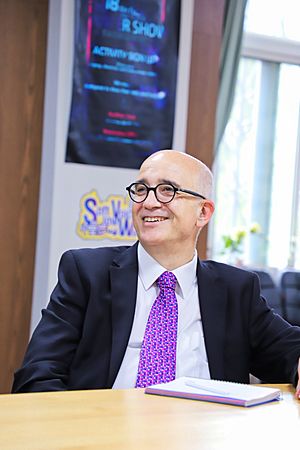Antonio Vidal-Puig facts for kids
Antonio Vidal-Puig is a Spanish doctor and scientist. He was born in Valencia, Spain, on June 12, 1962. He is a Professor at the University of Cambridge in the UK. He teaches about how our bodies use food and energy. Dr. Vidal-Puig is famous for his ideas on how to treat overweight and obesity. He also studies how fat storage can affect health. His work helps us understand conditions like diabetes and metabolic syndrome. In April 2024, he received a special honorary degree from King Juan Carlos University in Madrid.
Contents
Becoming a Scientist
Antonio Vidal-Puig studied medicine at the University of Valencia Medical School. He then trained to become an endocrinologist. This is a doctor who studies hormones and glands. He worked in Boston, USA, at Harvard Medical School from 1992 to 1999. In 2015, he also earned a business degree from the Cambridge Judge Business School.
His Work and Research
In 2000, Dr. Vidal-Puig started his own research lab, called the TVP Lab. It is located at the University of Cambridge. He became a Professor there, focusing on how our bodies use nutrients. He also works as a special consultant in metabolic medicine. In 2014, he became a Fellow of the Academy of Medical Sciences.
Dr. Vidal-Puig has worked with other scientists on important projects. He helped edit a book about metabolic syndrome in 2014. He also works with the National University of Singapore. Since 2019, he has been involved with the Cambridge University Nanjing Centre for Technology. He is a visiting professor at Nanjing University in China. There, he studies the growing problem of obesity and diabetes. He also leads a science panel for the European Research Council. In 2024, he was a special visiting professor at the National University of Singapore.
Important Scientific Ideas
Dr. Vidal-Puig's lab in Cambridge studies how our bodies use energy. They look at how fat is stored and how our bodies burn calories.
The TVP Lab's Focus
His lab explores how our bodies control energy. They study how fat is stored and how energy is used or saved. They also look at how too much fat can make our bodies less sensitive to insulin. This is important for understanding diabetes. They also study how to activate "brown fat" to burn more energy.
Key Concepts in His Research
Dr. Vidal-Puig has introduced two big ideas:
Fat Storage and Health
In 2006, he shared his idea about how fat tissue expands. When we eat more than we need, our bodies store extra energy as fat. This is normal. But, if we store too much fat, it can become a problem. This extra fat can build up in organs like the liver and heart. It can also cause inflammation. This can lead to health issues like metabolic syndrome, diabetes, and heart attacks. This idea helps explain why obesity can cause so many health problems.
Using Brown Fat to Fight Obesity
Brown fat is a special type of fat. It burns calories to create heat. Scientists have thought for a long time that we could use brown fat to help people with obesity. Dr. Vidal-Puig's team studies how brown fat works. They look at how our nerves, metabolism, and genes control it. They also test new ways to activate brown fat. His team found natural ways that fat cells burn more energy. This discovery could help create new treatments for overweight people.
Research Topics and Collaborations
Dr. Vidal-Puig has written many research articles. His work covers topics like how fat cells develop (Adipogenesis) and how our bodies use fats (Lipidomics). He also studies how fat can be harmful (Lipotoxicity) and how our immune cells (Macrophages) are involved. Other topics include metabolic syndrome, diabetes, and how cells clean themselves (Mitophagy).
He has worked with many other well-known scientists in Cambridge. These include Krishna Chatterjee, Sadaf Farooqi, Nita Forouhi, Giles Yeo, Stephen O'Rahilly, and Nick Wareham.
Awards and Recognition
Dr. Vidal-Puig has received many awards for his important work.
- In 2015, he gave the FEBS National Lecture.
- In 2016, he received the Maimonides Lecture Award from the University of Córdoba.
- In 2019, he gave the Sir Philip Randle Lecture for the British Biochemical Society.
He has also been given several special awards:
- The Lilly Foundation Distinguished Career Award (2015).
- The Hippocrates International Award for Medical Research on Human Nutrition (2015).
- The Society for Endocrinology Medal (2017).
See also
 In Spanish: Antonio Vidal-Puig para niños
In Spanish: Antonio Vidal-Puig para niños
 | Dorothy Vaughan |
 | Charles Henry Turner |
 | Hildrus Poindexter |
 | Henry Cecil McBay |


